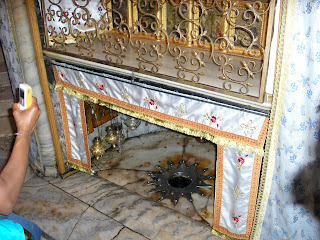Isaiah 9:2-7
Titus 2:11-14
Luke 2:1-14
Christmas pudding. Panettone. Mince pies. Turkey. Chocolate. Vegetarian nut roasts. Brussels sprouts. Smoked salmon. Pigs in blankets. Roast potatoes. Intriguing twists on old favourites devised by Jamie or Nigella. It’s quite likely, this Christmas, that most of us will end up consuming rather more protein and carbohydrate than usual. And why not – it is a feast day, and there is nothing wrong with enjoying the good things of creation, in moderation, of course.
In Biblical times, there wasn’t such a variety of delicious things on the menu. No turkeys, potatoes or chocolate, for instance, those all came over from America much later. The everyday staple of most people was bread, day in, day out. So bread was very important both in itself and symbolically. It is referred to a great deal in the Bible, and Jesus calls himself the Bread of Life.
But the first mention of bread in Luke’s Gospel is actually tonight, in a place name. Bethlehem means “House of Bread”. Probably because in ancient times the area was rich in grain. But it is also very fitting that Jesus, the bread come down from heaven, the one we need for our eternal nourishment, is born in a cave and laid in a manger in the House of Bread.
I had the great joy of visiting Bethlehem for the first time last year, and the place shown as the traditional site of the birth of Jesus is a cave. Bethlehem is built on a limestone ridge and there are many shallow caves just under the surface. In the first century, and even in some places today, dwellings in that part of the world were very simple: a structure above ground, for daytime and summer, and beneath, a cave, where the animals were kept and where the family slept in winter to keep warm.
Luke tells us that the new born Jesus was laid in a manger – a feeding trough – so this probably means that Joseph and Mary were staying with some relatives in a simple family home like that. As you go into that cave today in Bethlehem, there on the ground under the altar is a silver star, which according to tradition marks the exact place where Jesus was born.
Now that may seem a little naïve – how can we know that this was the precise place, and not, say, the cave next door?
But actually it is very important that there was a place, a little spot where God first touched the earth in Jesus. It is very important that a particular place is commemorated. There and not somewhere else, that time and not some other.
When God comes into the world in Jesus he becomes particular, limited in time and place, just as we are. He becomes inculturated, formed by the particular culture of first century Judaism into which he was born. He was bound in strips of cloth, which were used to straighten the legs of infants in days before people knew that rickets was a vitamin deficiency. But he was bound as well by culture, race, class, the particular circumstances of politics and foreign occupation.
This is the importance of Luke being so particular about the census and when it took place and who was in power, rather like the traditional chant I sang at the beginning of Mass. Not all the details are historically correct but that’s not the point, and Luke could not have known all the details first hand anyway. God come into our world enters particular circumstances and grows in a particular way. In entering the world, coming to us to save us, God must confine himself to a particular place, a particular time. But he does so in order to redeem all places, all times.
God become human redeems human nature, saves us from the legacy of violence, rivalry and sin which has been the way that human beings have tended to live throughout history. God become human makes possible a new way of being human, founded on self-emptying love. God shows us that new way of being human in Jesus. But he enables us to live that way, too, because Jesus is born to be the new Adam, the new human nature in which we can share.
We too, as St John will tell us tomorrow, have power to become children of God. If we turn to Jesus in repentance, believe in him as our Saviour and Lord, the he gives us his new life. We become one with him in his new humanity, the humanity based on love and not fear.
We may think we are not worthy to share the life of Jesus. Perhaps we will just admire him from a distance. A great spiritual figure, a profound teacher, perhaps. But I don’t want him to turn my life around. But no, he is born for me, and for you, he is born precisely to turn our lives around. He is born so that we can be born, reborn in him, and turn away from sin and darkness, to love and light and life.
Or perhaps we think our lives are too busy, too hectic, too anxious, no room. But the little space of our hearts is always enough for Jesus, just as was the “heaven and earth in little space” in Mary’s womb. The cave of the Nativity is found in our hearts too if we will let Jesus be born there.
And because this involves me and you, the new humanity that Jesus brings is not an individualistic thing. It is a community, a people, which we call the Church. The Church is the Body of Christ, the human nature which he has redeemed, living in the world and in the saints in heaven. And we enter the Body of Christ through baptism and are sustained and become more fully what that means through the sacrament of the Body of Christ, the Eucharist.
Christ the living bread gives himself to us under the form of bread, that we might become what he is. God was made flesh in an ordinary human baby in the obscurity of Bethlehem, and in the Eucharist he comes to us hidden in the ordinary, necessary stuff of daily life, in bread and wine, another “little space” in which his fullness dwells.
The Church, the community of the Eucharist, is itself a “house of bread”. The Church is a perpetual Bethlehem where Jesus is always being born, always touching earth in particular times and places wherever the Mass is celebrated. Here, tonight, for instance, and everywhere else in the world where Christians gather for this meal which both gives us and makes us the Body of Christ.
Jesus comes to us in love, to make us new. Whatever our lives have been up to now, whatever sin or mess or failure we may be conscious of, Jesus comes to make us new. A new beginning, a new humanity. This is his gift, we have only to open our hearts to him to receive it. The little space of our hearts and our lives is where he wants to dwell in the fullness of his divinity and love. Like that little star on the floor at Bethlehem, Christ will make of our lives a “touching place” where his love becomes real for us and for the world around us.







